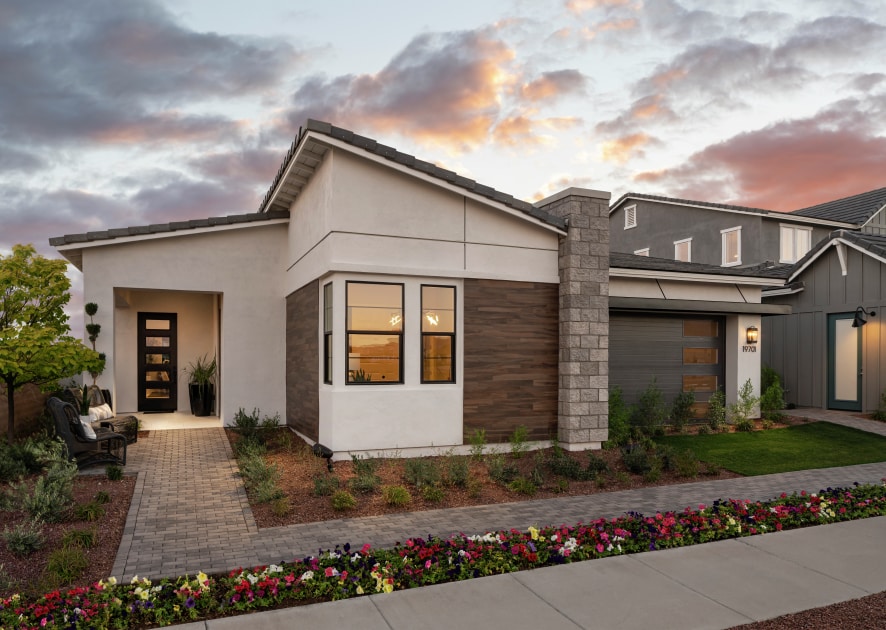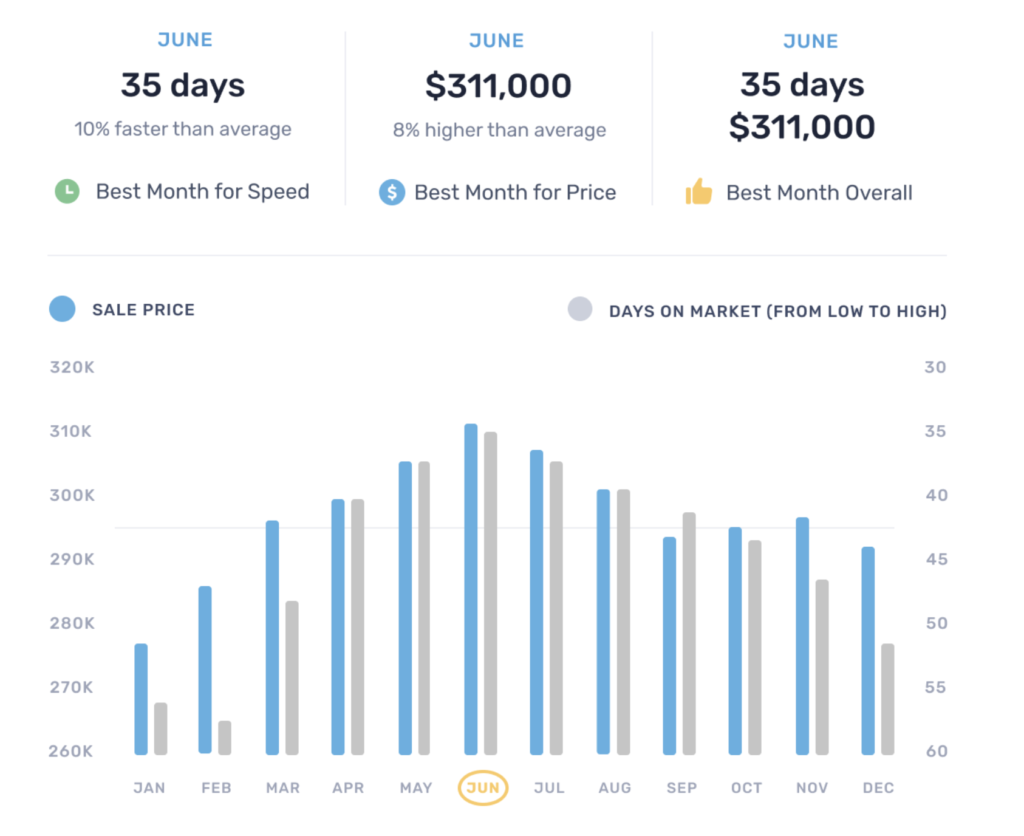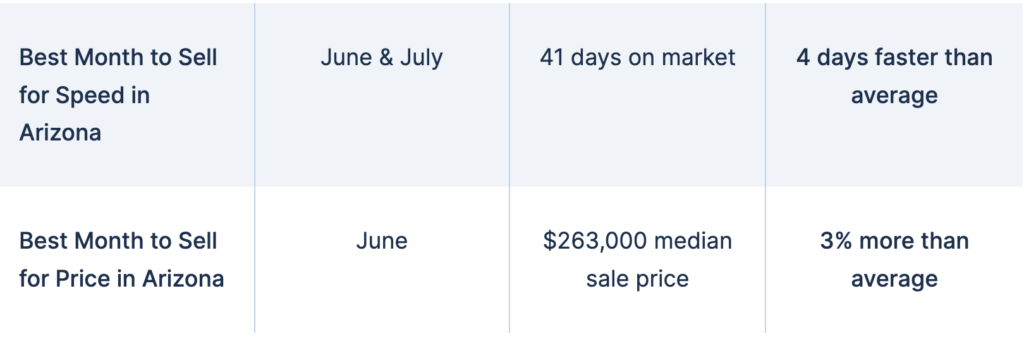
What’s AZ Property Match? We’re a free resource dedicated to helping you make smart decisions, sell fast, and save money in any real estate transactions.
Now is a good time to be selling a house in Arizona! According to Zillow Research, property values in the Grand Canyon State rose 5.89% in 2019, and are projected to rise a further 4.96% over the next year.
Of course, even the best Arizona properties will struggle to sell if you don’t price the home properly, do a poor job of marketing it, or don’t know how to handle the negotiations.
Read on to learn the eight steps to successfully selling your home in Arizona!
Table of Contents
1. Finding an Arizona Realtor
Selling a home isn’t easy. It’s a high-stakes, complex transaction and requires a considerable amount of time and expertise to get a good outcome. If you’re looking to sell your Arizona home for the best price — and minimize stress along the way — you need to find a top-rated Arizona real estate agent in your area.
The best Arizona listing agents know exactly what local buyers want and how to reach them. They’ll offer expert advice, guidance, and support every step of the way, from the initial listing all the way through closing.
In fact, sellers who work with real estate agents net 33% more, on average, than those who list on their own. For a $262,572 home — the median home value in Arizona, according to Zillow — that’s a premium of $86,649. In other words, hiring an agent is well worth the investment.

2. Deciding When To Sell
One of the most important factors in getting the best price for your home is to time the market specific to your area. Arizona’s real estate season is unique compared to the rest of the U.S. Unlike most states, the best time to sell your home in Arizona is in the fall.
September is the best month to list, with November averaging the highest closing rates of the year in Arizona. With the average sale taking three months from listing to close, listing your home in the early fall will help you finalize your sale during the best time of the year for maximum profit.
If possible, avoid selling January through April when listings sit on the market for a long time, and sellers get low closing rates.
Several cities in Arizona, like Phoenix, are undergoing city-wide renovations and revitalizations. This could be an important factor for driving up the selling price of your home any time of the year, and makes this year a great time to sell a home in the state of Arizona.
Best time to sell a house across the U.S.

Best time to sell a house in Arizona

3. Pricing Your Home
The length of time your home is on the market will be a determining factor for how much it sells for, and setting a competitive price will ensure it doesn’t stay on the market long. Home values in Arizona have taken large leaps in the last year, so it will be important to work with an agent who can take recent market increases into consideration. Property taxes are also low in Arizona, meaning if you set a higher price for your home, you’re more likely to get a buyer who can afford it knowing that property tax rates are low.
A real estate agent will be able to provide a comparative market analysis to help you determine the best listing price for your home. This is a tool that will allow you and your agent to compare similar sold listings in your area to land on effectively price your home.
But if you’re earlier in the process and just want a general idea of what your house is worth, a free online home value estimator is a great place to start. Enter your address below to see your estimated sale price, as well as useful local real estate market trends. Find out how much your house is worth now!
How much is your home worth?
4. Preparing, Marketing, & Showing Your Home
Before listing, make repairs on any damages. Then, consider renovations that could have an impact on how quickly your home sells and the types of buyers it will attract. Kitchen renovations will drive up the value of any home in any state, and the addition of a pool and new HVAC system will perk up a buyer’s interest in a hot state like Arizona.
Arizona is a state that is home to perfectly manicured lawns. The right curb appeal is sure to attract an Arizona buyer. Consider adding shrubs and hedges, updating the paint color of your home, and keeping your lawn mowed and bushes impeccably trimmed while your home is on the market.
Keep in mind that some cities in Arizona are hot spots for retirement due to warm weather. If your market is one that tends to attract retirees, be sure to market your home accordingly.
Learn More: The Best Paint Colors For Selling A House
Once you’ve updated your home, professional photos are important to include in your online listing. These photos could be the deciding factor on whether or not a buyer takes up an interest in your home. A real estate agent will have access to an MLS, which is by far the best way to get your listing out there and seen quickly.
A realtor’s website and social media pages will also be important to local buyers. Social sites like Facebook and Instagram will allow your agent to reach a wider audience, with would-be buyers’ friends tagging them in listings they might not otherwise see.
Before taking photos and hosting open houses and showings, a real estate agent will be able to help you stage your home. A perfectly staged home in Arizona, does include thinking about the lawn and curb appeal. A well-staged house will boost the effectiveness of your listing photos and your home houses.
Attractions and access to community amenities like pools and clubhouses, especially in retirement hot spots, will really boost your listing in Arizona. Consider these bonus items in your description.
Once your home is updated and staged and your listing is live, showings and open houses will begin. When it comes to an open house, a real estate agent will know how to get your home prepared and handle all of the hosting that comes with a showing or open house event. This includes cleaning, making sure the lawn is impeccable, and providing food so buyers stick around longer to check out your home.
Private showings, however, will be one of the most important events for selling your home. This might seem overwhelming, but a real estate agent will be able to meet buyers quicker, and while you’re at work, and manage scheduling multiple showings.
5. Fielding Offers & Negotiations
There is no state requirement on how long a seller has to accept an offer in Arizona, but sellers should respond with a counteroffer within a week. In most cases, you should only accept an offer from a buyer who offers earnest money, or a deposit, with their offer.
Some sellers may wait to see if another buyer outbids the original offer, allowing the seller grounds to request more time to review and accept an offer. However, if the home has been on the market for more than 60 days, it would be wise for the seller to consider taking a good offer as it initially comes in.
Once an offer has been accepted, buyers may negotiate when it comes to closing costs, transfer taxes, inspection fees, and other fees associated with the close. A buyer might also negotiate other items, like timeframes for appraisals, approvals, inspections, and the amount of earnest money deposited. Sellers should also ensure buyers are paying transfer taxes, remaining property taxes, and any legal costs associated with selling a home.
In Arizona, it can take up to 60 days to finalize a sale and purchase agreements. This can be a stressful time for a seller, and working with an experienced real estate agent can help ensure the process goes smoothly.
What's in a Purchase Agreement?
Remember, a purchase agreement is a legally binding contract. Make sure you fully understand it before signing.







6. Appraisal & Inspections
Before finalizing a purchase, both a home inspection and an appraisal done by a licensed Arizona appraiser need to take place.
Arizona buyers will pay for and arrange a home inspection before moving forward. If repairs need to be made following an inspection, you’ll need to decide if you want to make the repairs or negotiate the cost of these repairs by lowering the final selling price. Common repairs that follow an inspection include structural defects, building code violations, and safety concerns.
An appraisal shouldn’t be confused with a CMA. A CMA helps sellers understand what to price their home to sell based on other sale prices in the area for similar properties. An appraisal is strictly done to calculate the property’s value, regardless of the competition. In most cases, a seller can negotiate that the buyer pay the appraisal fees.
7. Paperwork and Required Arizona Disclosures
The state of Arizona requires that all sellers and brokers provide buyers with a disclosure statement before any contracts or paperwork can be signed. This is a document that shares any known defects or potential hazards with your home and the property it’s on.
While not every single defect down to a scratch on the wall needs to be disclosed, Arizona does have a law stating that sellers must disclose information to the buyer, if the buyer asks, about aspects of the property that normally might not be considered important to include.
There are several defects that should be considered important, and included upfront in the disclosure agreement. Defects like termite damage, water damage, damaged plumbing and electrical systems, foundation problems, ceiling or flooring issues, broken appliances, and an unpaid lien on the home from a contractor, are just some of the defects sellers must disclose in any state. Hazards such as methane gas, lead-based paint, asbestos, radon, or other toxic materials will need to be included in the disclosure statement.
Arizona also has specific laws around pool and soil disclosures. Seek advice from a real estate agent to make sure you include all disclosure requirements mandated by the state of Arizona to avoid any legal ramifications or lawsuits.
A licensed professional should walk you through all the paperwork and ensure you have everything you need for your situation.
Forms and Documents for Selling a House in Arizona
Required for All Real Estate Sales in Arizona
- 2 Forms of ID
- Copy of Purchase Agreement and Any Addendums
- Closing Statement
- Signed Deed
- Bill of Sale
- Affidavit of Title
Possible Additional Documents
- Loan Payoff Information
- HOA Forms and Guidelines
- Survey Results or Survey Affidavits
- Home Inspection Results
- Proof of Repairs or Renovations
- Home Warranty Information
- Copies of Relevant Wills, Trusts, or Power of Attorney Letters
- Relevant Affidavits (Name Affidavits, Non-Foreign Affidavit Under IRC 1445, etc.)
- Closing Disclosure (for certain seller concessions)
- Correction Statement and Agreement
Arizona Disclosure Forms
- Residential Seller's Property Disclosure Statement
- Comprehensive Loss Underwriting Exchange
- Condo Disclosure
- Soil Remediation Disclosure
- Swimming Pool Disclosure
- Flood Zone Statement
- Lead-Based Paint Disclosure
- Unincorporated Area Disclosure
8. The Closing Process
When it’s time to finalize our sale, your real estate agent will make sure everything is covered. The closing process in Arizona can sometimes span over days or up to a week. This is because not all parties are required to be sitting down at the same table to finalize a close in the state of Arizona.
The buyer’s lender will send the seller final loan documents before the close date is scheduled. In Arizona, the seller will typically sign their documents first. The buyer will then follow by signing all necessary documents, including the final loan.
Before finalizing the sale, the buyer will finish paying the seller for any remaining cost in the down payment and finalize any closing costs owed to the seller. Then, the buyer receives the keys and your home is officially sold.
Next Steps: Sell your Arizona home and save thousands
Whether you’re looking to list your Arizona home immediately or 6-12 months from now, it’s never too early to start looking for an agent, getting advice, and making a plan.
Want to Learn More About Your Real Estate Options?
Whether you’re a first-time homebuyer, a seasoned investor, or looking to sell, I’m here to help you explore your real estate options.
